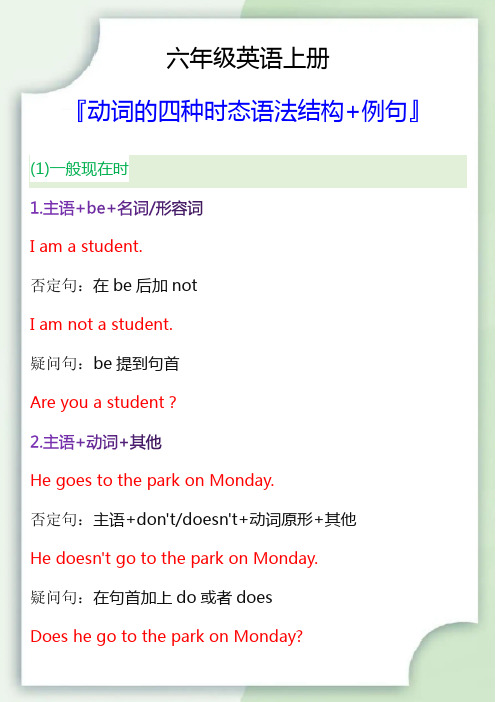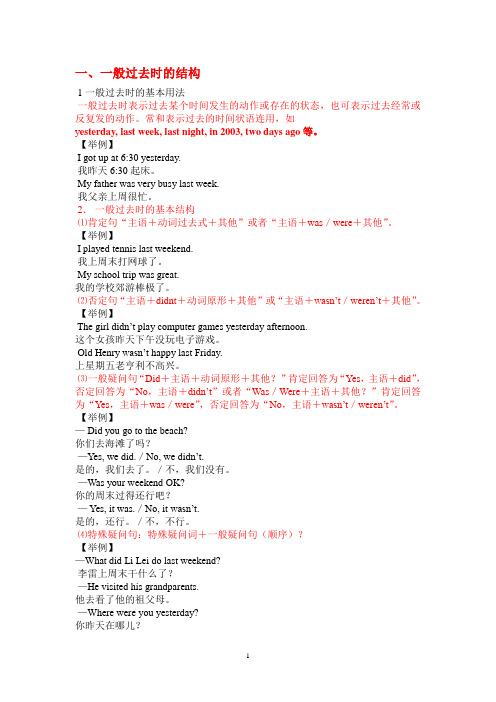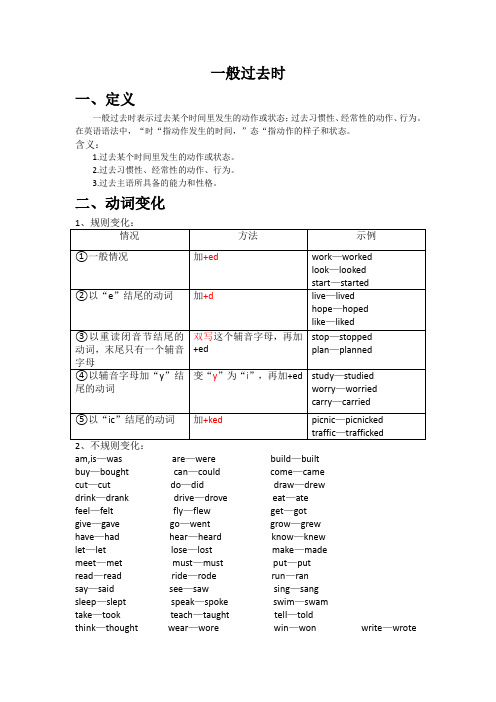小学六年级语法:一般过去时
六年级英语上册动词的四种时态语法结构+例句

六年级英语上册『动词的四种时态语法结构+例句』(1)一般现在时I am a student.否定句:在be后加notI am not a student.疑问句:be提到句首Are you a student?He goes to the park on Monday.否定句:主语+don't/doesn't+动词原形+其他He doesn't go to the park on Monday.疑问句:在句首加上do或者doesDoes he go to the park on Monday?(2)一般过去时He went to the market.否定句:在动词前加didn't,动词恢复原形;在be后加not He didn't go to the market.疑问句:在句前加did,或将be提到句首Did he go to the market?(3)一般将来时She is going to ride a horse.否定句:在be后加notShe is not going to ride a horse.疑问句:将be提到句首Is she going to ride a horse?I will go to the library.否定句:在will后加not,或缩写为won't I will not go to the library.疑问句:将will提到句首Will you go to the library?(4)现在进行时They are reading English.否定句:在be后加notThey are not reading English.疑问句:将be提到句首Are they reading English?回答:Yes, they are./No, they aren't.。
英语六年级语法

六年级英语语法:
1.一般过去时:
构成:主语+动词过去式(did)
-陈述句:肯定句:I went to Chinatown in New York Yesterday.
否定句:I didn’t do my homework yesterday.
-一般疑问句:Did you visit the museum last week?
-特殊疑问句:What did you do last night?
2.have/has got ...有...
- I’ve got some stamps from China. 我有一些中国的邮票。
- She’s got some books about animals. 她有很多关于动物方面的书籍.
3.一般现在时:
构成:主语+动词原形(do)
主语为单三+单词单数第三人称形式(does)
⏹We always have a big special dinner on Sundays.
⏹She sometimes has eggs for breakfast.
⏹Do you have a pen friend?
⏹Does she like listening to music?
⏹What do you usually do at weekends?
⏹She doesn’t watch TV at night.
4.can的用法
主语+can + 动词原形(do)
⏹I can run fast. But I can’t jump high.
⏹What can you do? Can you swim?。
小学六年级一般过去时态的基本结构

They didn’t go shopping last weekend.
--Yes,they did.
--No,they didn’t.
2.带实义动词的过去时态
The children had a good time in the park. 否定句:
主语+be动词的过去式(was,were)+~
主语+be动词的过去式(was,were)+ not+~
be动词的过去式(was,were)+主语+~
He was busy last Sunday.
--Was he busy last Sunday?
He was not busy last Sunday.
02
一般疑问句
The children didn’t have a good time in the park. Did the children have a good time in the park?
对划线部分提问
Where did the children have a good time?
单击此处添加副标题
一般过去时态的结构
商务工作计划通用模版
一般过去时态的基本结构
2.实义动词
They were happy. I/He/She/We/They played games last night.
1.be动词
主语+动词(be动词/实义动词)的过去式+其他 I was a student.
--Yes,he was.
--No,he wasn’t.
英语所有语法知识点六年级

英语所有语法知识点六年级一、动词时态1. 一般现在时:用于表示经常性或普遍性的动作、情况或状态例句:I play football every Sunday.2. 一般过去时:用于表示过去某个时间发生的动作或状态例句:She watched a movie yesterday.3. 一般将来时:用于表示将来要发生的动作或情况例句:I will visit my grandparents next week.4. 进行时态:用于表示正在进行的动作例句:They are eating lunch now.5. 完成时态:用于表示已经完成的动作或状态例句:He has finished his homework.二、名词1. 可数名词与不可数名词例句:There are three apples on the table. (可数名词) I want some water. (不可数名词)2. 单数名词与复数名词例句:The dog is cute. (单数名词)The dogs are playing in the park. (复数名词)3. 名词所有格例句:Tom's book is on the table.三、形容词与副词1. 形容词用于修饰名词,表示名词的性质、特征或状态例句:She has a beautiful flower.2. 副词用于修饰动词、形容词或副词,表示方式、程度或时间等例句:He runs quickly.四、冠词1. 不定冠词(a/an)用于泛指单数可数名词前例句:I see an apple.2. 定冠词(the)用于特指或泛指某个人或物例句:The cat is on the table.五、代词1. 主格代词用于作主语例句:She is my friend.2. 宾格代词用于作宾语例句:He gave me a present.3. 物主代词表示所属关系例句:This is his book.六、介词1. 介词用于表示位置、时间、原因、方式等例句:He is in the park.2. 一些常见介词:in, on, at, with, for, to 等七、连词1. 并列连词用于连接同等重要的词、短语、句子等例句:I like apples and oranges.2. 从属连词用于引导从句例句:She is happy because she won the game.八、疑问词1. 疑问词用于构成疑问句例句:Where is the book?九、形容词比较级与最高级1. 形容词比较级用于表示两者之间的比较例句:She is taller than her sister.2. 形容词最高级用于表示三者或三者以上的比较例句:She is the tallest girl in the class.十、情态动词1. 情态动词用于表示能力、可能性、许可等例句:I can swim.十一、直接引语与间接引语1. 直接引语直接引述别人的原话例句:He said, "I am happy."2. 间接引语是对别人的话进行转述例句:He said he was happy.以上是六年级英语的所有语法知识点,掌握这些知识将会帮助你更好地理解和运用英语语法。
人教版小学六年级英语各时态结构总结及练习题(cy)

一、一般过去时的结构1一般过去时的基本用法一般过去时表示过去某个时间发生的动作或存在的状态,也可表示过去经常或反复发的动作。
常和表示过去的时间状语连用,如y esterday, last week, last night, in 2003, two days ago等。
【举例】I got up at 6:30 yesterday.我昨天6:30起床。
My father was very busy last week.我父亲上周很忙。
2.一般过去时的基本结构⑴肯定句“主语+动词过去式+其他”或者“主语+was/were+其他”。
【举例】I played tennis last weekend.我上周末打网球了。
My school trip was great.我的学校郊游棒极了。
⑵否定句“主语+didnt+动词原形+其他”或“主语+wasn’t/were n’t+其他”。
【举例】The girl didn’t play computer games yesterday afternoon.这个女孩昨天下午没玩电子游戏。
Old Henry wasn’t happy last Friday.上星期五老亨利不高兴。
⑶一般疑问句“Did+主语+动词原形+其他?”肯定回答为“Yes,主语+did”,否定回答为“No,主语+didn’t”或者“Was/Were+主语+其他?”肯定回答为“Yes,主语+was/were”,否定回答为“No,主语+wasn’t/were n’t”。
【举例】— Did you go to the beach?你们去海滩了吗?—Yes, we did./No, we did n’t.是的,我们去了。
/不,我们没有。
—Was your weekend OK?你的周末过得还行吧?— Yes, it was./No, it wasn’t.是的,还行。
/不,不行。
⑷特殊疑问句:特殊疑问词+一般疑问句(顺序)?【举例】—What did Li Lei do last weekend?李雷上周末干什么了?—He visited his grandparents.他去看了他的祖父母。
一般过去时态

came
did drew drank drove ate fell
想要 问 参观 变 爬 跳 下雪
want -- wanted ask—asked visit—visited turn—turned climb—climbed jump—jumped snow—snowed
不规则动词表
Infinitive am is Past tense was Infinitive catch Past tense caught
are
begin break bring build buy can
were
begun broke brought built bought could
come
改写句子:
PRACTISE
That’s 1、Lucy did her homework at home.(改否定句)
Lucy _______ her homework at home. didn’t _______ do
great√
2、He played beach volleyball with his friend last week.(变一 般疑问句) Did play beach volleyball ______ he _____ ______ ___________ with his friend last week?
ห้องสมุดไป่ตู้
常用时间
常与一般过去时态连用的时间有:
yesterday yesterday morning (afternoon, evening…) last night year…) (week, month,
(科普版)小学六年级英语一般过去时

一般过去时一、定义一般过去时表示过去某个时间里发生的动作或状态;过去习惯性、经常性的动作、行为。
在英语语法中,“时“指动作发生的时间,”态“指动作的样子和状态。
含义:1.过去某个时间里发生的动作或状态。
2.过去习惯性、经常性的动作、行为。
3.过去主语所具备的能力和性格。
二、动词变化am,is—was are—were build—builtbuy—bought can—could come—camecut—cut do—did draw—drewdrink—drank drive—drove eat—atefeel—felt fly—flew get—gotgive—gave go—went grow—grewhave—had hear—heard know—knewlet—let lose—lost make—mademeet—met must—must put—putread—read ride—rode run—ransay—said see—saw sing—sangsleep—slept speak—spoke swim—swamtake—took teach—taught tell—toldthink—thought wear—wore win—won write—wrote三、句法结构当句子中出现“yesterday,last night,in1997,two days ago”等单词时,则要注意动词是否需要变过去式。
1、肯定形式主语+动词过去式+其它例句:She often came to help us in those days.I did my homework yesterday evening.2、否定形式主语+didn't +谓语动词原形+其它①was/were+not;例句:I wasn’t at home yesterday.②在行为动词前加didn't,同时还原行为动词例句:I didn't know you like coffee.3、一般疑问句①Did+主语+谓语动词原形+其它?例句:Did I do homework?②Was/Were+主语+表语?例句:Were you late yesterday?4、特殊疑问句①疑问词+ did+主语+动词原形+其它?例句:What did you do last weekend?②疑问词+was/were+主语+其它?例句:Where was he yesterday?When were you born?记忆口诀:一般过去时并不难,过去动作、状态记心间。
六年级一般过去时

一般过去时(一)定义:表示过去发生的动作或者事情。
时间状语:last year/month/week… ten years agoYesterday/the day before yesterday构成:1.主语+be动词过去式[was(am,is的过去式)/were(are的过去式)]2.主语+动词的过去式(did)特别提醒:切忌不要随便加be动词(was/were),有be动词的时候表示的是过去存在的状态,was/were不能同时和其他动词一起出现。
1.含有be动词的过去时(表示过去存在的状态)Eg: Cherry was thin ten years ago.Cherry ________thin ten years ago.(否定句)______ Cherry thin ten years ago? (疑问句)Yes, she was. No, She wasn’t.Where were you yesterday?2.含有实意动词的过去时(表示过去发生的动作)Eg: They played basketball last night.They ____________ basketball last night.(否定句)_____ they________ basketball last night?(疑问句)Yes,they did. No,they didn’t.Where did he go last Monday?动词过去式的变化规律例词1)以字母e结尾的动词,则只加d use-used dance-danced2)以辅音字母加y结尾,把y改成i,再加edstudy-studied carry-carried注意:play-played,因为它是元音加y结尾。
stop-stopped shop-shopping3)以重读闭音节结尾的动词,则要双写最后一个字母,再加上ed.4)一般在动词的后面加上ed. look-looked walk-walked专项训练Ex.1用所给动词的适当形式填空。
- 1、下载文档前请自行甄别文档内容的完整性,平台不提供额外的编辑、内容补充、找答案等附加服务。
- 2、"仅部分预览"的文档,不可在线预览部分如存在完整性等问题,可反馈申请退款(可完整预览的文档不适用该条件!)。
- 3、如文档侵犯您的权益,请联系客服反馈,我们会尽快为您处理(人工客服工作时间:9:00-18:30)。
教案学生姓名年级六年级上课校区宝儿艺术授课日授课时间授课教师卜老师期授课主题6A 语法:一般过去时针对性教学目理解一般过去时的定义,掌握动词对应的变化形式。
标跟踪内容课堂习题加讲解作业内容课后练习教学设计一般过去时1.一般过去时表示过去某个时间发生的动作或存在的状态,常和表示过去的时间状语连用。
一般过去时也表示过去经常或反复发生的动作。
常用的时间状语:yesterday, just now , a moment ago , last week,last year,last Friday,last National Day holiday,the day before yesterday...2.Be动词在一般过去时中的变化:⑴am 和is在一般过去时中变为was。
(was not=wasn’t)⑵are在一般过去时中变为were。
(were not=weren’t)⑶带有was或were的句子,其否定、疑问的变化和is, am, are一样,即否定句在was或were后加not,一般疑问句把was或were调到句首。
3.句中没有be动词的一般过去时的句子否定句:didn’t +动词原形,如:Jim didn’t go home yesterday.一般疑问句:在句首加did,句子中的动词过去式变回原形。
如:Did Jim go home yesterday? 特殊疑问句:⑴疑问词+did+主语+动词原形?如: What did Jim do yesterday?⑵疑问词当主语时:疑问词+动词过去式?如:Who went home yesterday?动词过去式变化规则:1.一般在动词末尾加-ed,如:pull-pulled,cook-cooked ,shout-shouted ,point-pointed,2.结尾是e加d,如:taste-tasted , like-liked3.末尾只有一个元音字母和一个辅音字母的重读闭音节,应双写末尾的辅音字母,再加-ed,如:stop-stopped4.以“辅音字母+y”结尾的,变y为i,再加-ed,如:study-studied5.不规则动词过去式: am,is-was, are-were, do-did, see-saw, say-said, give-gave, get-got, go-went, come-came, have-had, eat-ate, take-took, run-ran, sing-sang, put-put, make-made, read-read, write-wrote,draw-drew, drink-drank, fly-flew, ride-rode, speak-spoke, sweep-swept, swim-swam, sit-sat ,become-became, take-took,can-could,swim-swam, bring-brought,drive-drove过去时练习:写出下列动词的过去式is\am_________ fly_______ plant________ are ________drink_________play_______ go________ make ________ does_________ dance________ worry________ ask _____ taste_________ eat__________ draw________ put ______ throw________ kick_________ pass_______ do ________ Be动词的过去时练习一、用be动词的适当形式填空。
1. I ______ an English teacher now.2. She _______ happy yesterday.3. They _______ glad to see each other last month.4. Helen and Nancy ________ good friends.5. The little dog _____ two years old this year.6. Look, there ________ lots of grapes here.7. There ________ a sign on the chair on Monday.8. Today _____ the second of June. Yesterday ______ the first of June. It _____ Children’s Day. All the students ______ very excited.二、句型转换。
1. There was a car in front of the house just now.否定句:________________________________________________一般疑问句:____________________________________________肯、否定回答:__________________________________________2.I went to the park last weekend.(改为一般疑问句)________________________________________________________(改为否定句)_________________________________________________________三、中译英。
1.我的故事书刚才还在手表旁边。
___________________________________________________________2.他们的外套上个礼拜放在卧室里了。
___________________________________________________________3.一会以前花园里有两只小鸟。
___________________________________________________________行为动词的过去时练习一、用be动词的适当形式填空。
1. I ______ (watch) a cartoon on Saturday.2. Her father _______ (read) a newspaper last night.3. We _________ to zoo yesterday, we _____ to the park. (go)4. ______ you _______ (visit) your relatives last Spring Festival?5. ______ he _______ (fly) a kite on Sunday? Yes, he ______.6. Gao Shan _______ (pull) up carrots last National Day holiday.7. I ____________ (sweep) the floor yesterday, but my mother ______.8. What ______ she _______ (find) in the garden last morning? She__________ (find) a beautiful butterfly.二、句型转换。
1. They played football in the playground.否定句:________________________________________________一般疑问句:____________________________________________肯、否定回答:__________________________________________过去时综合练习(1)一、用动词的适当形式填空。
1. It ______ (be) Ben’s birthday last Friday.2. We all ______ (have) a good time last night.3. He ________ (jump) high on last Sports Day.4. Helen ________ (milk) a cow on Friday.5. She likes ______ newspapers, but she ______ a book yesterday. (read)6. He _______ football now, but they _______ basketball just now. (play)7. Jim’s mother _________ (plant) trees just now.8. _______ they ________ (sweep) the floor on Sunday? No, they _____.9. I _______ (watch) a cartoon on Monday.10. We ___________ (go) to school on Sunday.过去时综合练习一、用动词的适当形式填空。
1. It _____ (be) the 2nd of November yesterday. Mr White ________ (go) to his office by car.2. Gao Shan ________ (put) the book on his head a moment ago.3. Don’t ______ the house. Mum _______ it yesterday. (clean)4. What ____ you ______ just now? I _______ some housework. (do)5. They _________ (make) a kite a week ago.6. I want to ______ apples. But my dad _______ all of them last month. (pick)7. _______ he ______ the flowers this morning? Yes, he _____. (water)8. She ____ (be) a pretty girl. Look, she _____ (do) Chinese dances.9. The students often _________ (draw) some pictures in the art room.10.What ______ Mike do on the farm? He ________ cows. (milk)二、中译英。
